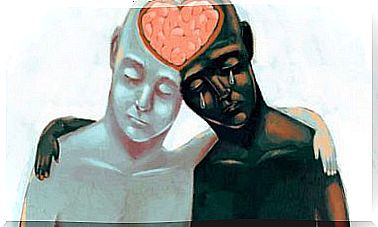Verbal Violence: How To Tell If You Are A Victim?

Words have incredible power: they can lift or destroy, calm or hurt. We often forget about it and coexistence can become complicated due to verbal contrasts which, within certain limits, are natural and positive. Some discussions, on the other hand, only have the effect of deeply hurting and are very negative and verbal violence is an aspect of the conflict.
It is a form of aggression that instead of helping the other to grow, has the sole objective of hurting.
When the words of others affect our thoughts and beliefs, it becomes very difficult to guess that you are a victim of verbal violence . There are, however, some important signs that help us understand if we are in a situation of this type.
1. It’s not just a question of shouting
You may feel that you are a victim of verbal violence when your partner does nothing but raise his voice with you. This actually includes a series of behaviors in which the victim is manipulated into doubting their beliefs, memories or even their mental health.
The aggressor can physically threaten us or a loved one, but that doesn’t necessarily happen. Just because a person is not acting violently does not mean that they are not engaging in abuse anyway.
Even more, the abuser could engage in extremely affectionate behavior and cause greater harm. The victim, in this way, lives in constant fear that the other may suddenly lose his temper.
2. Your partner makes comparisons that hurt you, blames you for everything, is jealous and possessive

A partner who exercises verbal violence against you constantly compares you to someone else, whether it be the cutest friend or the closest friend. There is always someone who is worth more than you.
Sometimes he will do it subtly, perhaps speaking of a celebrity; the bottom line is that his words make you feel inferior.
Or he blames you for everything, even what you cannot control. Criticize your job, your salary, the way you dress, your body. It is always there to remember your flaws, amplifying them.
He always has a negative word for your friends, especially if they are of the same gender. He hates when a schoolmate or colleague calls you and can’t stand your having an active social life.
3. You never know if he has offended you
Do you think it is easy to understand if you are a victim of verbal violence? In reality there are many people who, after having suffered this type of abuse in childhood, fall victim again in a completely unconscious way.
The abuser may offend you with a joke or joke that makes you feel bad. A derogatory comment offered with a beautiful smile, a disguised attack on your abilities, skills or values.
No matter how sweetly flavored they are, what you need to ask yourself is how these “innocent” comments make you feel.
4. You too are turning into aggressors

You can continue to be victimized, become verbally violent, or both. In essence, the pattern of violence is difficult to break. Until you realize that the problem has become serious and seek support, it is almost impossible to break this chain of behaviors.
Being raised in an environment where parents were unable to control their emotions can cause us to become verbally aggressive adults, unable to manage our feelings.
On the other hand, if you manage to put an end to a love relationship because you are a victim of this type of violence, there is a high probability that you will become an aggressor yourself in the next couple you will form.
5. How do you feel?
It is vital that at every stage of your relationship you ask yourself this question: ” How do I feel ?” It will help you understand if your partner is making you truly happy and confident. If you are a victim of verbal violence, self-esteem is the first to abandon you.
The longer you expose yourself to these kinds of comments, the easier it will be to start believing that the insults and criticisms are true. You begin to wonder why you always feel fear, sad or nervous when you are in the company of your partner or when you are about to meet him.
6. Verbal violence is a problem not to be underestimated

The fact is that we all have flaws and problems. Arguments, differences are natural within the couple. What is not normal, and what we must never allow, is that the other:
- Make us feel inferior. It is clear that in some contexts there are better people than us, but we must never lose sight of the difference between humility and offensive messages.
- You cause us emotions such as sadness or depression. If you are constantly hurting and seeing your partner generates more negative than positive feelings, perhaps you should start distancing yourself.
If you think you are a victim of verbal abuse, don’t ignore the signs. Seek help from a professional, therapist, or psychologist.









